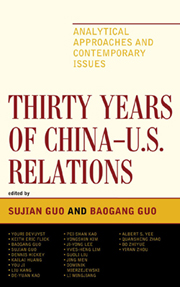Books by Sujian Guo
Published Books
| The Palgrave Handbook of Local Governance in Contemporary China (Palgrave-Macmillan, 2019) | |
|
Governance in Transitional China (Shanghai People’s Press, 2017) |
|
|
China Green and Low Carbon Development and Transition (Zhejiang University Press, 2017) |
|
|
Global Sustainable Energy Competitiveness: BRICS in Focus (Zhejiang University Press, 2016) |
|
|
Global Sustainable Energy Competitiveness Report (Zhejiang University Press, 2015) |
|
|
The Political Economy of China's Great Transformation The book consists of three parts: first, covering the current political transformation, providing a general political background for the socio-economic, fiscal, urban and rural transformation...(more) |
|
|
Theorizing Chinese Citizenship This volume theorizes the concept of citizenship in contemporary China by probing into the formation of Chinese citizenship and synthesizing the practices of citizenship by different social groups. The first section, “Imagining Chinese Citizenship,” analyses how Chinese citizenship was first imagined by means of translation and education at the beginning of the twentieth century. The Chinese citizenship was then compared with the concept of Western citizenship and that of other Asian countries. The second section, “Citizenship of Chinese Migrant Workers,” explains..(more) |
|
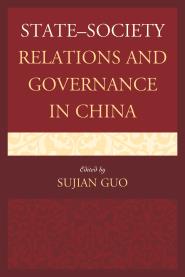 |
State-Society Relations and Governance in China State–society relations and governance are closely related areas of study and have become important topics in the social sciences in the past decades, not only in developed countries but also in the developing world. In China, state-society relations have been changing in the new era of reform and opening, and governance has become a central concern in policy practice and in academia...(more) |
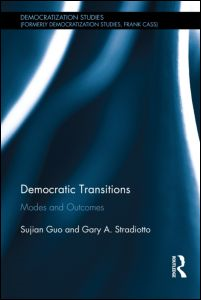 |
Democratic Transitions: Modes and Outcomes This book offers cross-national comparisons of democratic transition since the turn of the twentieth century and asks what makes democracies succeed or fail. In doing so it explores the influence the mode of transition has on the longevity or durability of the democracy, by theoretically examining and quantitatively testing this relationship. The authors argue that the mode of transition directly impacts the success and failure of democracy, and suggest that cooperative transitions, where opposition groups work together with incumbent elites to peacefully transition the state, result in democracies that last longer and are associated with higher measures of democratic quality...
|
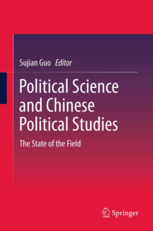 |
Political Science and Chinese Political Studies: the State of the Field The excellent articles in this eye-opening volume offer the analyses of diverse but extremely well-informed scholarship on these most vital matters. This book is a must read for anyone seeking to comprehend these most profound questions about how Chinese political studies has developed and where it is heading. —Edward Friedman, University of Wisconsin, Madison A thought-provoking collection that draws together Chinese and western scholars to ruminate about the field of Chinese politics. This book shows us how research is changing, how area and disciplinary approaches can support each other, and how “indigenous” and western concepts can deepen the study of Chinese politics. —Kevin J. O'Brien, University of California, Berkeley |
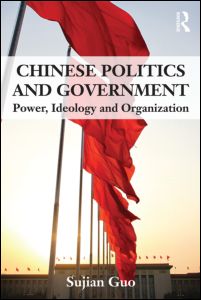 |
Chinese Politics and Government: Power, Ideology and Organization "This book fills a crying need for a readable yet thorough text on Chinese politics that provides a clear analysis and description of the Chinese political process itself while also putting it in a comparative context. Guo's work describes the formal structure and informal workings of the Chinese political system, with attention to the Chinese cultural and Marxist ideological backgrounds, showing the relevance of the study of Chinese politics to more general empirical theories in political science." —Peter Moody is Professor of Political Science at The University of Notre Dame in South Bend, Indiana. "This textbook is an excellent example of combining theories of Chinese political studies with comprehensions of PRC political practices. It is written with insights penetrating into the essence of the Chinese political system and perspectives positioning this system in the comparative contexts of world communism and international politics — its depth has reached an admirable level of scholarship." —Guoguang Wu, Professor of Political Science and Chair in China and Asia-Pacific Relations, University of Victoria, Canada. |
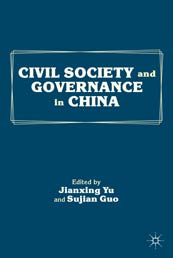 |
Civil Society and Governance in China "State-society relations have changed in important ways in recent years, and various sorts of non-governmental organizations (NGOs) are emerging. Do these NGOs mean that 'civil society' is developing? What does 'civil society' mean in the context of China? Are these new NGOs improving governance in China? What do they mean about the future development of state-society relations? Jianxing Yu, Sujian Guo, and their contributors explore these questions in this timely and important book."—Joseph Fewsmith, professor of International Relations and Political Science and director of Boston University Center for the Study of Asia "Scholars have long hotly debated how theoretical and conceptual understandings of civil society can apply to China. This book does not seek to come up with one single Western or Chinese answer to the problem, but rather attempts to understand how the interaction of state and society solves important problems of public policy and public goods provision in China. By looking at the intersection of governance and social participation, the authors provide valuable insights into state-society relations in a changing institutional environment."—Gunter Schubert, professor and chair of Greater China Studiesn at University of T�bingen |
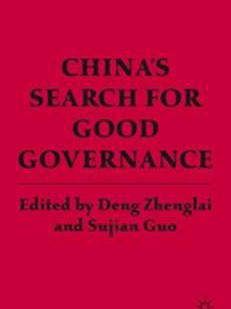 |
China's Search for Good Governance 'The focus of this work is on the problem of 'governance,' the effective exercise of authority over society and society's acknowledgement of that authority, an issue of both practical and intellectual current relevance. The book is certainly timely now.' - Peter R. Moody, Professor of Political Science, University of Notre Dame, USA |
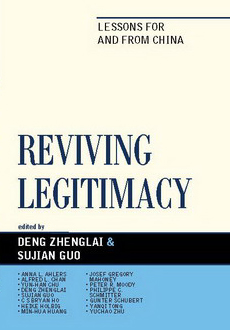 |
Reviving Legitimacy: Lessons for and from China "This collection of essays sheds new light not just on the potential for democratic rule in China, but also on sources of legitimacy that do not fit neatly in the dichotomy between "good" democratic and "bad" authoritarian regime types. Highly recommended reading for anybody concerned about the theory and practice of Chinese politics and what it can offer to the rest of the world."—Daniel Bell, Tsinghua University (Beijing) and Jiaotong University (Shanghai) |
|
|
Thirty Years of China-US Relations: Analytical Approaches and Contemporary Issues "Thirty Years of China–U.S. Relations is a thought-provoking collection that will prod even informed readers to rethink some of their most basic premises about Chinese foreign policy."—Edward Friedman, University of Wisconsin "This collection of essays by both well-established and younger scholars, mainly from China and elsewhere in east Asia, provides substantively rich and theoretically informed perspectives on the development of relations between China and the United States in the three decades since normalization; it is especially timely now when Sino-American relations and perhaps world history generally have reached a new turning point."—Peter R. Moody, Jr., University of Notre Dame |
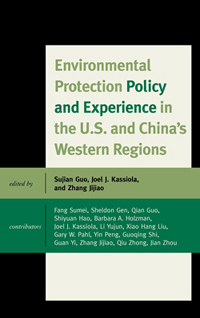 |
Environmental Protection Policy and Experience in the U.S. and China's Western Regions "The U.N. Climate Conference in Copenhagen made clear that the fate of the planet rests in large part on the environmental policies of two superpowers, China and the United States. This volume could not be more timely with its analysis and comparison of environmental policy in China and the United States."—Carlos Davidson, San Francisco State University "The strength of this book lies in the contributors' shared and genuine attempt to explore the potential of mutual learning in environmental protection between the United States and China. The comparative case studies included in the volume are coherent as a whole, and highly relevant to the field of environmental politics individually."—Fengshi Wu, Chinese University of Hong Kong |
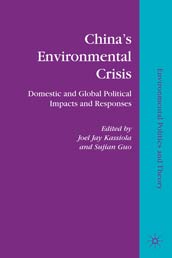 |
China's Environmental Crisis: Domestic and Global Political Impacts and Responses “The authors cover a wide span of issues ranging from the analysis of current ecological conditions (such as desertification, biodiversity, and food security, all closely interlinked to global climate change) to the role of environmental NGOs and social change caused by environmental issues and governance. Going beyond a pure scientific description of environmental issues, the book provides valuable insights in their possible reasons and ways out and shows the interdependencies of economic growth, environmental degradation, and their repercussions on the Chinese society.... Containing important insights into China’s most challenging environmental issues, this book is a must for environmental policy analysts.”—Andreas Oberheitmann, International Director, Research Center for International Environmental Policy, Tsinghua University |
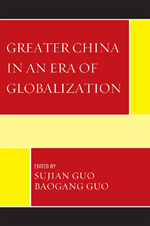 |
Greater China in an Era of Globalization This book looks at the success of China and its surrounding territories of Taiwan, Hong Kong, and Macau and asks the question "What is Chinese globalization?". The contributors in this volume look to answer this question by examining China's role both in its immediate sphere of influence and in the greater world. In doing so, the contributors argue that its push to globalize has had as much effect on the country itself, both politically and culturally, as it has had on the world. The contributors further the argument by analyzing China's influence on the rising nations in Africa and Latin America, before ending the book with a comparative analysis between it and the historic rise and fall of influence of its European counterparts. |
 |
Harmonious World and China's New Foreign Policy The concept “harmonious world” has become new principles and goals of Chinese foreign policy under the fourth generation leadership. But, the question remains about the exact meanings of these principles and slogans, and their policy implications for Chinese foreign policy behavior. This is the first edited volume that attempts to address this significant question, and its insightful contributions would help this academic field understand new dimensions of Chinese foreign policy and their implications for China’s relations with the world. |
 |
China in Search of a Harmonious Society This book examines the new concept of “building harmonious society” proposed by the Chinese leadership under Hu Jintao, its important implications for the future of Chinese political development, and some major issues and questions in China’s academic and public debate on the search for a harmonious society. |
 |
Challenges Facing Chinese Political Development A topical examination of some of the most recent developments in Chinese politics. Featuring a roster of international scholars, the book comprises an assortment of essays focusing on a particular dimension or specific issue of political culture, political economy, foreign policy, environmental and social challenges... |
 |
New Dimensions of Chinese Foreign Policy An in-depth analysis of China's new place in international affairs. Taking Hu Jintao's proposal for "peaceful development" as a starting point, the contributors in this volume examine the new trends of thought in the fourth generation of Chinese policymakers... |
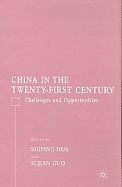 |
China in the Twenty-First Century: Challenges and Opportunities This edited volume looks at China in the twenty-first century from a holistic perspective. Each of the ten authors emphasizes a particular dimension of politics, political economy, political culture and foreign policy focusing on a specific issue within the broader dimension... |
 |
The Political Economy of Asian Transition from Communism The author conducts a comparative study of the political economy of the transition from communism in East and Southeast Asian countries (China, North Korea, Vietnam, Laos and Cambodia), addressing the key theoretical questions generated from the debate between shock-therapists and gradualists... (Review by DPR) |
 |
China's Peaceful Rise in the 21st Century: Domestic and International Conditions This comprehensive and timely study examines the conditions and challenges of China's 'peaceful rise' and addresses the central question of whether it is possible for China to 'rise peacefully' in the 21st century, bearing in mind the implications for China and the rest of the world... |
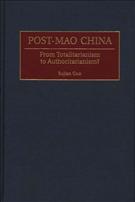 |
Post-Mao China: from Totalitarianism to Authoritarianism? The author seeks to reconstruct a plausible macro-model in conceptual and comparative terms for defining "regime identity" and assessing the nature of regime change. Professor Guo then applies the model to the study of regime change in post-Mao China and reevaluates post-Mao changes across the five major empirical aspects of regime change (political, ideological, economic, legal, and social) and the most critical dimensions of each. |

